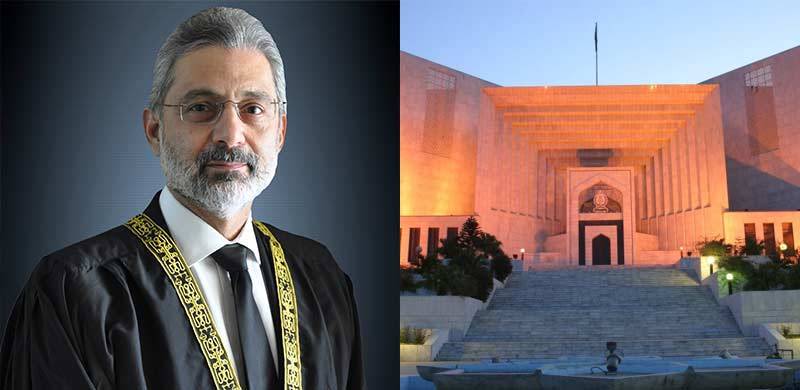
Another sorry episode in Pakistan's politico-legal history has come to an end. There can be no more powerful denunciation of the government's position than the fact that the Supreme Court has quashed the presidential reference against Justice Qazi Faez Isa.
The proceedings around this reference have been both all too familiar and unusually disturbing.
First, the usual: like so many other recent episodes, this was an entirely avoidable embarrassment for the PTI-led government. There would have been no need for this whole process, were it not for the government's indecent haste to wage legal warfare against those perceived to be on the wrong side of the high and the mighty. To the extent that the apex court has quashed the reference, it means that Justice Isa's fundamental position gains credence, i.e. that the president did not form his own independent opinion before filing the reference; the government wrongly applied Section 116 (b) of the Income Tax Ordinance (2001) to Justice Isa's wife and children; and law enforcement agencies such as the FIA were misused by the government.
The weakness of the government's arguments once again blurs the line between malice and sheer incompetence – as has happened far too often since 2018.
Yet this episode also stands out from the usual victimization that we have come to associate with Naya Pakistan. This is because it targeted and brought into controversy senior figures from the judiciary. In the apex court, true enough, the reference failed to stand. But in the 'court' of public opinion, the lesson being drawn is that even senior judges are not to be spared the treatment that this government has been meting out to those perceived to have unwisely questioned power.
With the opposition and the media already largely subdued through brutish coercion, the judiciary remains a bastion which can – with all the legitimacy conferred on it by law – call into question the actions of the powerful. This, despite the fact that the public image of the judiciary has been buffeted by outrage from both the current ruling party and those who oppose it at various times.
Pakistan's judiciary has been repeatedly turned into the site of political battles which ought to have been fought elsewhere. The treatment meted out to Justice Isa reflects how little the Independence of the judiciary matters to those in power.
Zarina Montserrat Khoso Carrera, the wife of Justice Qazi Faez Isa, still has to clear the matter of her properties with the FBR, as the apex court has deferred the issue to tax authorities. It remains an open question as to how impartially the FBR can assess the matter, given the obviously partisan attitude of the government to which that institution answers.
It has doubtless been a difficult time for her, as it has been for Justice Isa. In this context, one is constrained to note the dignity displayed by this latest target of the government's wrath.
The proceedings around this reference have been both all too familiar and unusually disturbing.
First, the usual: like so many other recent episodes, this was an entirely avoidable embarrassment for the PTI-led government. There would have been no need for this whole process, were it not for the government's indecent haste to wage legal warfare against those perceived to be on the wrong side of the high and the mighty. To the extent that the apex court has quashed the reference, it means that Justice Isa's fundamental position gains credence, i.e. that the president did not form his own independent opinion before filing the reference; the government wrongly applied Section 116 (b) of the Income Tax Ordinance (2001) to Justice Isa's wife and children; and law enforcement agencies such as the FIA were misused by the government.
The weakness of the government's arguments once again blurs the line between malice and sheer incompetence – as has happened far too often since 2018.
Yet this episode also stands out from the usual victimization that we have come to associate with Naya Pakistan. This is because it targeted and brought into controversy senior figures from the judiciary. In the apex court, true enough, the reference failed to stand. But in the 'court' of public opinion, the lesson being drawn is that even senior judges are not to be spared the treatment that this government has been meting out to those perceived to have unwisely questioned power.
With the opposition and the media already largely subdued through brutish coercion, the judiciary remains a bastion which can – with all the legitimacy conferred on it by law – call into question the actions of the powerful. This, despite the fact that the public image of the judiciary has been buffeted by outrage from both the current ruling party and those who oppose it at various times.
Pakistan's judiciary has been repeatedly turned into the site of political battles which ought to have been fought elsewhere. The treatment meted out to Justice Isa reflects how little the Independence of the judiciary matters to those in power.
Zarina Montserrat Khoso Carrera, the wife of Justice Qazi Faez Isa, still has to clear the matter of her properties with the FBR, as the apex court has deferred the issue to tax authorities. It remains an open question as to how impartially the FBR can assess the matter, given the obviously partisan attitude of the government to which that institution answers.
It has doubtless been a difficult time for her, as it has been for Justice Isa. In this context, one is constrained to note the dignity displayed by this latest target of the government's wrath.
